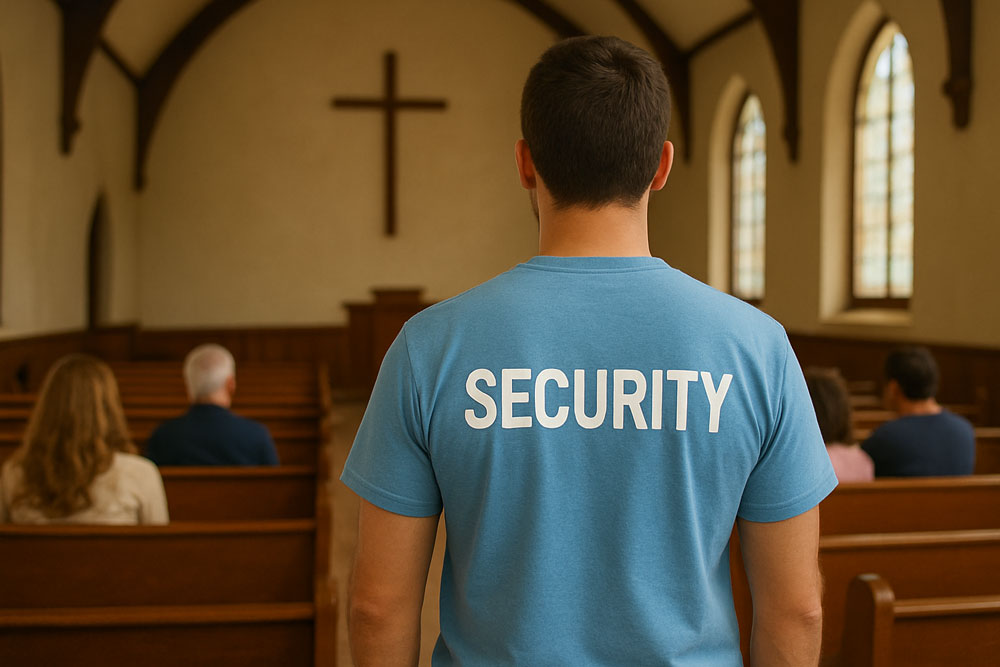Part 1: SB 1454: Triggers for Security Licensing and Volunteer Limitations
California SB 1454 (2024) amended multiple sections of the Business & Professions Code relating to the Bureau of Security and Investigative Services (BSIS). The “trigger” language refers to when licensure or registration is required and what happens if those conditions are not met. Specifically, SB 1454 states:
“Existing law prohibits a person from engaging in a business regulated by the Proprietary Security Services Act or the Private Security Services Act unless registered or licensed with the department, as specified. This bill would make it an infraction for a person to engage in a business regulated by the acts specified above without being registered or licensed, as provided.” 1 2
What Changed?
- Before SB 1454: Operating without a license was unlawful, but enforcement was inconsistent.
- After SB 1454: The bill triggers an infraction if any person engages in security services (covered by the Proprietary Security Services Act or Private Security Services Act) without proper BSIS registration or licensure.
- This means NGOs, Houses of Worship, or companies that use volunteers or contractors in roles that meet the statutory definition of “security guard” could now face direct infractions if those individuals are not licensed employees under a Proprietary Private Security Officers (PPO) or a Proprietary Private Security Employer (PSE).
SB 1454 Trigger Conditions Explained
- Employee Status
- If a person is employed or compensated (wages, stipends, even gift cards), they are no longer considered a “volunteer” under the law.
- Once compensation is involved, the individual is treated as an employee and must meet BSIS requirements.
- Security Functions
- Performing duties that fall under the Proprietary Security Services Act or Private Security Services Act—such as guarding persons or property, detaining, patrolling, or intervening—triggers the need for licensure.
- Even unarmed roles (e.g., crowd control, access enforcement) can qualify as “security” under the statute.
- Public Interface (Uniformed Presence)
- SB 1454 specifically calls out Proprietary Private Security Officers (PSOs):
- Unarmed security employees who wear a distinctive uniform and
- Interact with the public while performing their duties.
- Once those two conditions are met, the person must be registered with BSIS, complete mandated training, and be managed under a PSE or PPO license.
- SB 1454 specifically calls out Proprietary Private Security Officers (PSOs):
Implications for Nonprofits & Churches
- Old Exemption Removed: SB 1454 eliminated the charitable/faith-based exemption. Churches and nonprofits are now subject to the same licensing rules as commercial entities.
- Volunteers in Uniform: Even volunteers may trigger PPSO requirements if they wear uniforms and interact with the public.
- Compliance Path:
- Keep volunteers in plain clothes, observer/report roles (no enforcement, no uniform).
- Or convert them into employees under a PPO/PSE, with payroll, insurance, and BSIS registration.
Takeaway
The three triggers: employee status, security functions, and public interface in uniform are the bright lines under SB 1454. If any combination applies, BSIS licensure and compliance are required.
Why It Matters
- Trigger Point: The act of engaging in security services without licensure now automatically creates a violation (an infraction).
- Impact on NGOs/Churches: If volunteers are used in guard roles, SB 1454 makes clear that this triggers non‑compliance because they are not licensed employees.
- Compliance Path: Either contract with a PPO/vendor or formally employ guards under a PPO/PSE license. Volunteers may only serve in non‑intervention safety roles to avoid triggering infractions.
The trigger language in SB 1454 is that any person engaging in security services without BSIS licensure or registration commits an infraction. This closes loopholes and makes enforcement more direct, especially for nonprofits or Houses of Worship relying on volunteers in guard roles.
__________________________________________________________________
Part 2: Volunteers are Not Completely Exempt
Unpaid volunteers are not exempt from BSIS oversight if they are performing a “security function.” Under California SB 1454 (effective Jan 1, 2025), the old exemption for charitable and faith-based organizations was removed. This means that any individual, paid or unpaid, who performs duties that meet the statutory definition of a security guard or proprietary security officer must be registered with BSIS and managed under a licensed PPO or PSE.
Why Volunteers Are Not Exempt
- SB 1454 Removed Exemptions:
Previously, “charitable philanthropic societies or associations” (which included churches and ministries) were exempt from the Private Security Services Act. SB 1454 explicitly removed that exemption. - Security Function Defined:
Under California Business & Professions Code (B&P) § 7582.1(e) and § 7574.01(g), a person is legally considered a security guard (under PPO licensing) or a Proprietary Private Security Officer (PSO) (under PSE registration) if they engage in any of the listed functions, not all of them. Performing even one of these duties places the individual within BSIS regulation. - B&P § 7582.1(e) – Security Guard Definition
A person is deemed to be engaged in the business of a security guard if they:
- Protect individuals or property from injury, theft, or unlawful activity.
- Prevent entry to property by unauthorized persons.
- Control, detain, or direct individuals for security purposes.
- Wear a uniform and interact with the public in a protective capacity.
- B&P § 7574.01(g) – Proprietary Private Security Officer (PSO) Definition
A person is considered a PSO if they are employed exclusively by one employer (not a contractor).
- Perform security functions such as:
- Wearing a distinctive uniform clearly identifying them as security.
- Interacting with the public while on duty.
- Providing security services only for that employer’s property or operations.
Key Compliance Point
- Engaging in any one of these activities (e.g., guarding property, deterring disturbances, wearing a uniform while interacting with the public) is enough to trigger BSIS regulation.
- This means churches, nonprofits, and businesses must either:
- Contract with a licensed PPO, or
- Register as a PSE and ensure their in‑house officers are licensed as PSOs.
Under B&P § 7582.1(e) and § 7574.01(g), any single qualifying activity, such as guarding, deterring, or wearing a uniform in a protective role, makes a person a security guard or PSO subject to BSIS oversight. It is not necessary to perform all listed duties; one is sufficient to trigger regulation.
Compensation Is Not the Trigger Alone
Even if unpaid, once a volunteer performs security functions (detaining, patrolling, intervening), they fall under BSIS jurisdiction. The law regulates the function, not just the pay status.
Practical Implications for Houses of Worship & NGOs
- Volunteers May Still Serve—But Only in Non-Intervention Roles:
- Greeters, ushers, parking lot monitors, hospitality, and “observe & report” functions are permissible.
- They must not detain, patrol, or intervene in disturbances.
- If Volunteers Act as Security Guards:
- They must be converted into employees under a PPO/PSE.
- They must be paid at least minimum wage ($16.50/hr for 2025) and covered by payroll, workers’ comp, and training requirements.
- Liability Exposure:
- If a house of worship uses unpaid volunteers in true “security” roles, it risks BSIS enforcement and civil liability if an incident occurs.
Takeaway
Unpaid status does not exempt a volunteer from BSIS oversight. If they perform security functions, they must be treated as employees under a PPO/PSE license. To remain compliant, churches should either:
- Limit volunteers to non-intervention safety roles (observers/reporters), or
- Convert them into paid, licensed employees under a PPO/PSE.
__________________________________________________________________
Part 3: Volunteer Safety Teams vs. Security: California Compliance Realities
In California, nonprofit NGOs and churches may use volunteers, but volunteers cannot legally act as “security guards” under a PPO or PSE license. If volunteers perform duties that meet the statutory definition of a security guard (e.g., detaining, patrolling, intervening), they must be employees paid at least minimum wage under California Business & Professions Code and labor law. Volunteers may only serve in non-intervention safety roles (observers, greeters, reporters) unless formally employed and licensed.
Legal Framework
- Volunteer Definition (Labor Code § 1720.4):
A volunteer is someone who offers services without pay, freely and without coercion, typically for a nonprofit, religious, or civic organization. Volunteers cannot replace paid employees or perform duties that mimic employment. - B&P §§ 7580.8–7580.10:
Define the employer–employee relationship in the private security industry. Guards working under a PPO or PSE must be employees. - B&P § 7582.1(e):
Defines a security guard/officer as an employee of a PPO or PSE. Volunteers are not included. - B&P § 7583.3(e):
Prohibits PPOs from using non-employees (volunteers, contractors) as armed guards. - California Labor Law:
Employees must be paid at least $16.50/hour (2025 minimum wage). Part-time (<30 hours/week) does not trigger health care benefits but still requires wages and overtime compliance.
What NGOs Can Do
- Permissible Volunteer Roles:
- Greeters, ushers, parking lot monitors.
- Observation/reporting (call 911, radio for licensed guard).
- General hospitality or crowd management without enforcement.
- Not Permissible Without Employment:
- Detaining individuals.
- Patrolling as “security.”
- Carrying weapons or acting as armed guards.
- Compliance Options for NGOs:
- Contract with a PPO/vendor → Licensed, paid guards.
- Convert volunteers into part-time employees under PPO/PSE → Paid, compliant with BSIS.
- Use volunteers only in non-intervention safety roles → Keeps them outside BSIS regulation.
Staffing Comparison: Volunteers vs. Employees (California)
Swipe left on mobile to see the rest of the information in the table below.| Category | Volunteers (Safety Team) | Employees under PPO/PSE |
|---|---|---|
| Legal Status | Not defined as “security guards” under B&P § 7582.1(e) | Must be employees per B&P §§ 7580.8–7580.10 |
| BSIS Compliance | Outside BSIS regulation if limited to observation/reporting | Fully regulated by BSIS; requires PPO/PSE oversight |
| Permissible Duties | Greeting, ushering, monitoring, reporting, calling 911 | Guarding persons/property, intervention, enforcement |
| Prohibited Duties | Detaining, patrolling, carrying weapons, acting as armed guards | Allowed if licensed and trained under PPO/PSE |
| Compensation | No wages; may receive expense reimbursements | Must be paid at least CA minimum wage ($16.50/hr) |
| Benefits | None required | Part-time (<30 hrs/week) avoids ACA health care trigger, but wages/overtime still apply |
| Insurance Impact | Lower liability exposure if limited to non-intervention | Payroll adds cost to workers’ comp and general liability |
| Training Records | Informal; not tracked by BSIS | Mandatory BSIS training documentation and recordkeeping |
| Risk Exposure | Liability shifts to volunteer personally if they intervene | Liability managed through PPO/PSE compliance and insurance |
Summary
California allows nonprofits to use volunteers, but volunteers cannot legally serve as “security guards” under BSIS licensing. They can only act in non-intervention safety roles. If an NGO wants volunteers to function as guards, they must be hired as employees, paid minimum wage, and managed under a PPO/PSE license.
- Volunteers can serve in non-intervention safety roles (observers, greeters, ushers).
- Employees under PPO/PSE are required for licensed guard functions (patrolling, detaining, armed security).
- NGOs must budget for security if they want compliance: either pay a vendor, pay a PPO to manage volunteers as employees, or limit volunteers to observation/reporting roles.
Sources:
- Law Soup Cal – Volunteer Laws in California
- LegalClarity – California Volunteer Laws
- Kearnan Consulting – SB 1454 Update for Faith-Based Organizations
- BSIS – SB 1454 New Legislation Alert
- Public Safety Training LLC – SB 1454 and Church Security
- 1 Bill Text: CA SB1454 | 2023-2024 | Regular Session | Amended | LegiScan
- 2 SB 1454 New Legislation Alert

